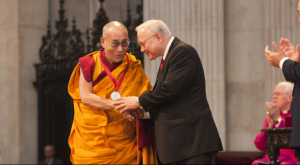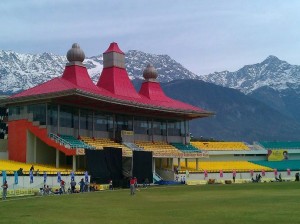The John Templeton Foundation has bestowed upon His Holiness the 14th Dalai Lama the 2012 Templeton Prize for his outstanding promotion of harmony amongst various religious traditions, his approach of non-violence as a means for conflict resolution, and most importantly, for advocating compassion as a way of life.
The award ceremony took place at the magnificent St. Paul’s Cathedral in London on the 14 May and was attended by dignitaries from around the globe. The Right Reverend Michael Colclough, Canon Pastor at St. Paul’s Cathedral, commended the event and said, “A non-violent voice of peace and reason in a calamitous world, the Dalai Lama represents core values cherished by many different faiths. The award of the Templeton Prize to the Dalai Lama under the dome of St. Paul’s Cathedral will be a reminder that working towards peace and harmony is a practical and spiritual challenge to all faith communities.”
Apart from the honors, a sum of £1.1 million (about 1.7 million U.S. dollars) was also awarded to His Holiness, which he promptly donated to charity. The 76-year old Tibetan spiritual leader addressed the gathering, saying “When I heard today your decision to give me this quite famous award, I really felt this another sign of recognition about my little service to humanity, mainly non-violence and unity around different religious traditions.” He added, “When Nobel Peace Prize announced my name, at that time I expressed that I am no more, no less, just a simple Buddhist monk. So still, I am a simple Buddhist monk, no less, no more, after receiving this award.”
Other prominent laureates include Mother Teresa, who rehabilitated thousands of slum dwellers in Kolkata and worked tirelessly for the good of the poor, and Chiara Lubich, who founded Italy’s Focolare movement during the 2nd World War that works for the welfare of the underprivileged and has since spread its operations around the world.
The Templeton Prize itself was first introduced in the year 1972 by Sir John Templeton, who felt that the Nobel Committee had neglected the importance of spirituality in its prize categories and was adamant in creating an award that would recognize contributions in that regard. The foundation’s nine judges evaluate the typical 15 to 20 nominations of the year and later cast individual ballots to determine the eventual winner. His Holiness’s extensive work on bridging and creating collaborative research between Buddhism and science has resulted in the founding of the Mind and Life Institute in 1987. His effort in this field attracted the initial nomination and ultimately the honor itself.





 Print
Print Email
Email